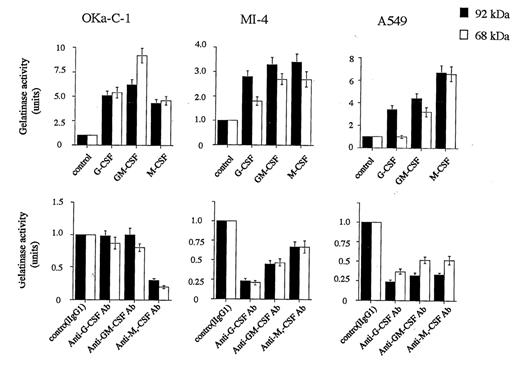Abstract
In advanced clinical stage, many cases of lung cancer produce colony-stimulating factors (CSFs), including granulocyte-colony stimulating factor (G-CSF), granulocyte macrophage-colony stimulating factor (GM-CSF), and macrophage-colony stimulating factor (M-CSF). The biological properties of the overproduction of CSFs by tumor cells are not well understood. We previously found that CSFs produced by two lung cancer cell lines, OKa-C-1 and MI-4, which constitutively produce abundant amounts of G-CSF, GM-CSF, and M-CSF, stimulate the tumor’s own growth through an autoctine mechanism. In this study, we examined whether CSFs produced by tumor cells contribute to the invasion of the tumor itself.
Invasive behaviors of the cancer cells were stimulated by exogenous CSFs but were suppressed by neutralizing antibodies against the CSFs. Matrix-degrading proteinases also are essential for successful tumor cell metastasis. Gelatin zymographs of conditioned media revealed two major bands of gelatinase activity at 68 and 92 kDa. The enzyme activities at 68 and 92 kDa were significantly enhanced in the presence of each CSF in the cell lines but were suppressed by the antibodies against the CSFs. The two gelatinase bands were characterized as matrix metalloproteinase (MMP)-2 and MMP-9, respectively. Our findings suggest that CSFs produced by tumor cells might be closely associated with the tumor invasion through gelatinase activation in CSF-producing lung cancer cells. In addition, an increase of invasion capacity and gelatinase activity by the CSFs might be mediated through the p44/42 mitogen-activated protein kinase (MAPK) signaling pathway.
Author notes
Corresponding author


This feature is available to Subscribers Only
Sign In or Create an Account Close Modal